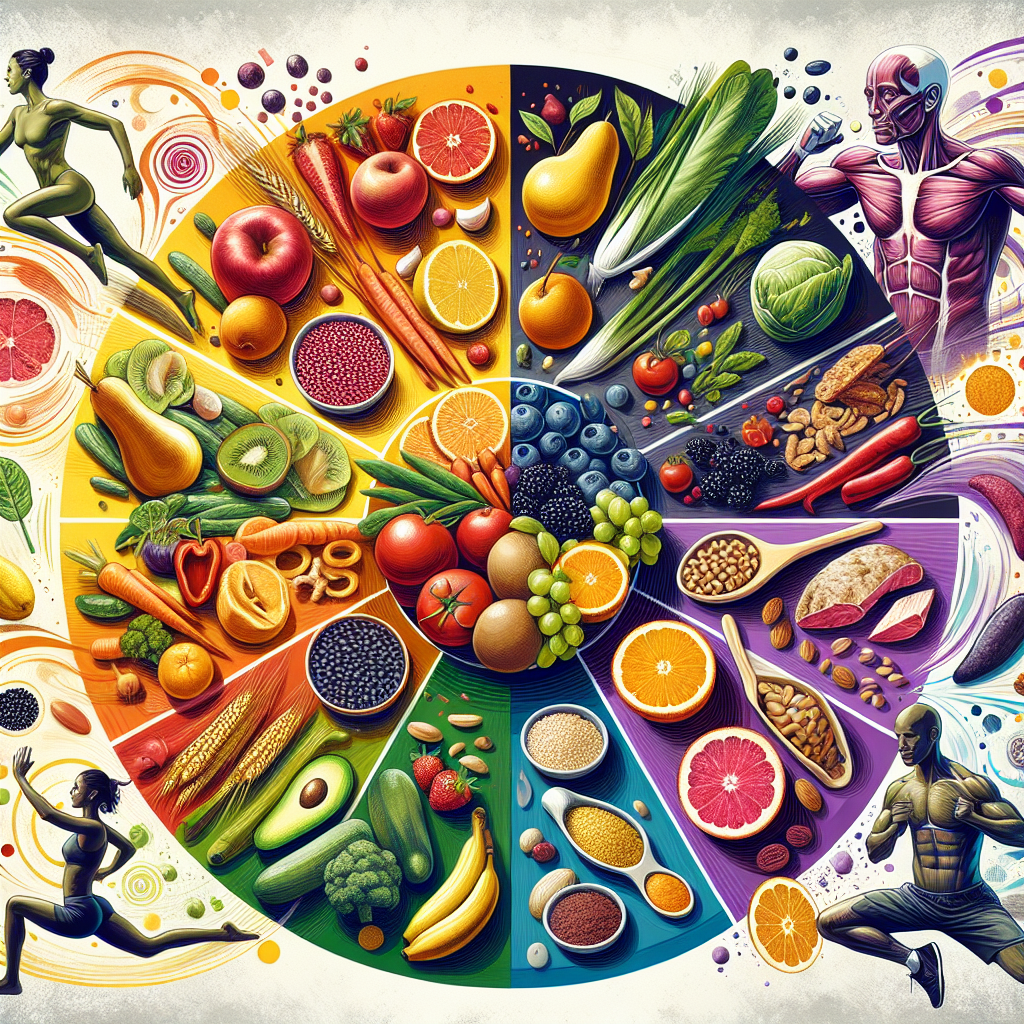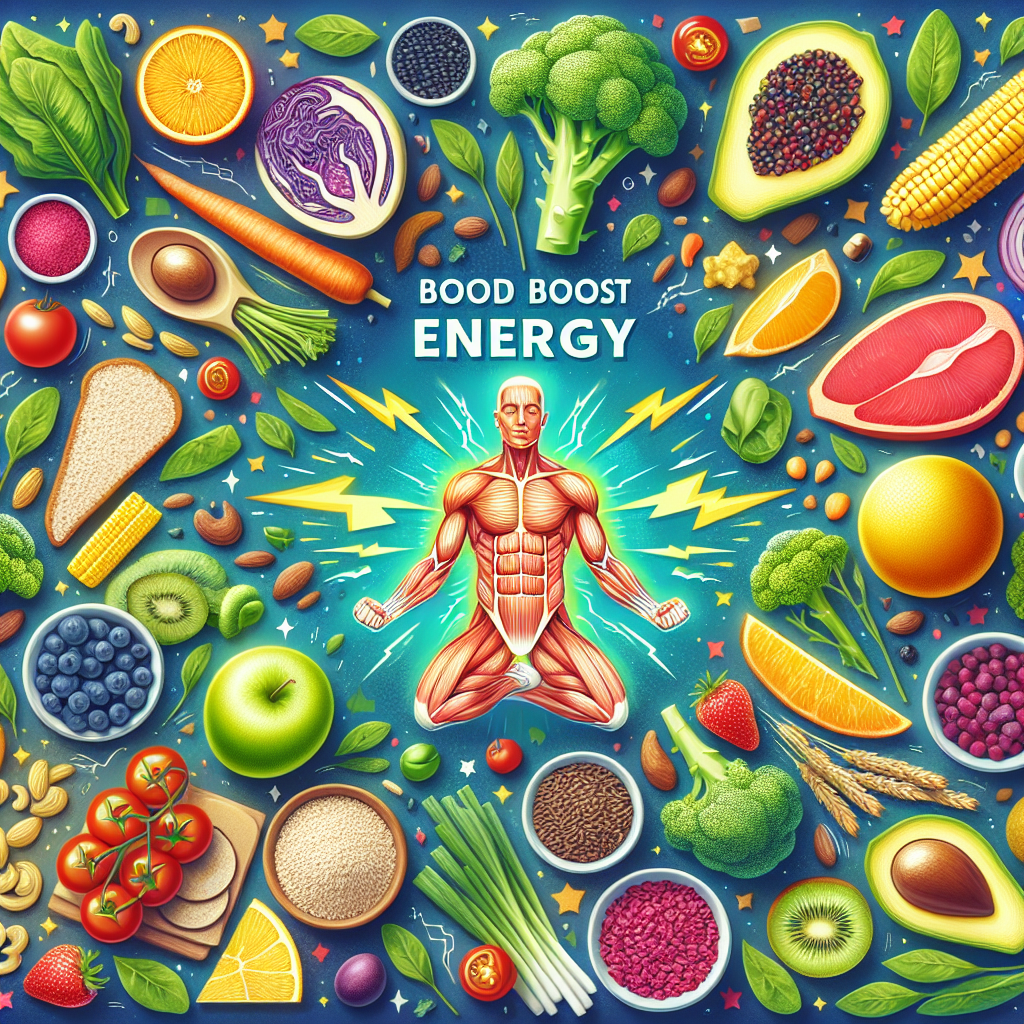Fueling Energy: Diets That Power Up Your Vitality Levels. Looking to boost your vitality levels and feel more energized throughout the day? Look no further than the power of your diet. In this article, we will explore a selection of nutritious food choices that can fuel your energy levels, leaving you feeling vibrant and alive. From the antioxidant-rich properties of berries to the brain-boosting benefits of fatty fish, get ready to discover the fuel that will power up your vitality levels and leave you ready to take on whatever the day may bring. Let’s dive into the world of energy-boosting diets and uncover the secrets to a more energetic life.
Why is diet important for boosting energy?
Maintaining high energy levels throughout the day is crucial for productivity, focus, and overall well-being. While there are many factors that influence energy levels, diet plays a central role in providing the necessary fuel to power your body and mind. Consuming a balanced diet that is rich in key nutrients can significantly boost your energy levels and help you stay energized throughout the day.
The role of nutrients
Nutrients are the components of food that provide the energy and raw materials needed for the body to function properly. They serve as fuel for energy production, support various bodily processes, and help maintain overall health. When it comes to energy levels, there are several key nutrients that play a crucial role in providing the energy needed by your body.
Impact of food on energy levels
The food you eat has a direct impact on your energy levels. Consuming foods that are high in refined sugars, unhealthy fats, and empty calories can lead to energy crashes and fluctuations. On the other hand, choosing nutrient-dense foods that are rich in essential nutrients can help stabilize blood sugar levels, improve metabolism, and provide sustained energy throughout the day.
Link between diet and vitality
Your diet has a significant impact on your vitality levels. A diet that lacks essential nutrients can leave you feeling tired, sluggish, and prone to fatigue. On the other hand, a well-balanced diet that provides an adequate intake of key nutrients can enhance your overall vitality, improve cognitive function, and boost physical performance. By making smart dietary choices, you can optimize your energy levels and unlock your full potential.
Key nutrients for energy
To maximize your energy levels, it’s important to include various key nutrients in your diet. These nutrients work together to provide the necessary fuel for energy production and support overall vitality. Here are some of the key nutrients that play a crucial role in boosting energy:
Carbohydrates
Carbohydrates are the body’s primary source of energy. They are broken down into glucose, which is used by the cells to produce ATP (adenosine triphosphate), the molecule that fuels cellular metabolism. Opting for the right types of carbohydrates is essential for sustained energy levels.
Proteins
Proteins are not only crucial for muscle growth and repair but also play an important role in energy production. They are made up of amino acids, which are used by the body to synthesize enzymes, hormones, and other molecules that are involved in energy metabolism.
Healthy fats
While fats have long been demonized, healthy fats are actually an important source of energy. They provide a concentrated source of calories and are essential for the absorption of fat-soluble vitamins. Including healthy fats in your diet can help sustain energy levels and improve brain function.
Vitamins and minerals
Vitamins and minerals are vital for energy production and overall vitality. B vitamins, in particular, play a crucial role in converting food into energy and supporting optimal energy metabolism. Additionally, minerals such as iron, magnesium, and potassium are essential for maintaining energy levels and supporting various cellular processes.
Hydration
Proper hydration is often overlooked but is crucial for maintaining optimal energy levels. Dehydration can significantly impact your energy and leave you feeling fatigued. Ensuring an adequate intake of water and other hydrating fluids is essential for sustaining energy throughout the day.

1. Carbohydrates
Carbohydrates are often misunderstood and wrongly vilified in the context of energy and weight management. However, they are a vital nutrient that serves as the body’s primary source of energy. Carbohydrates provide the glucose needed to fuel cellular metabolism and maintain optimal energy levels.
Simple vs complex carbohydrates
Carbohydrates can be categorized into two main types: simple and complex. Simple carbohydrates, found in foods such as white bread, candy, and sugary drinks, are quickly digested and absorbed, leading to rapid spikes in blood sugar levels followed by energy crashes. On the other hand, complex carbohydrates, found in whole grains, legumes, and vegetables, are digested more slowly, providing a steady release of energy over time.
Good sources of carbohydrates
When it comes to choosing carbohydrates, it’s important to opt for nutrient-dense sources that offer additional health benefits. Whole grains, such as quinoa, brown rice, and oats, are excellent sources of complex carbohydrates, fiber, and important micronutrients. Legumes, such as lentils and chickpeas, are also rich in complex carbohydrates and protein. Additionally, fruits and vegetables contain natural sugars along with fiber, antioxidants, and other essential nutrients.
Effect on blood sugar levels
Consuming simple carbohydrates, such as refined sugars and processed foods, can lead to rapid spikes in blood sugar levels. This sudden surge in glucose is quickly metabolized, leading to a subsequent drop in blood sugar levels and energy crashes. On the other hand, complex carbohydrates are digested more slowly, leading to a gradual release of glucose and a more stable blood sugar level.
2. Proteins
Proteins are often associated with muscle growth and repair, but they also play a crucial role in energy production. The building blocks of proteins, amino acids, are essential for the synthesis of enzymes, hormones, and other molecules involved in energy metabolism.
Importance of protein for energy
Proteins play a vital role in energy production. They provide amino acids that are used to synthesize enzymes and other molecules involved in energy metabolism. In addition, protein can help regulate blood sugar levels, prevent energy crashes, and support overall vitality.
Complete vs incomplete proteins
Proteins are made up of essential and non-essential amino acids. Essential amino acids cannot be produced by the body and must be obtained through the diet. Complete proteins contain all the essential amino acids in adequate amounts, while incomplete proteins lack one or more essential amino acids. Consuming a variety of protein sources can help ensure an adequate intake of all essential amino acids.
Plant-based protein sources
While animal products are often associated with high-quality protein, plant-based sources can also provide all the essential amino acids needed for energy production. Legumes, such as beans and lentils, soy products, quinoa, and hemp seeds are excellent sources of plant-based protein. Combining different plant-based protein sources can help ensure a complete amino acid profile.
Impact of protein on metabolism
Protein has a higher thermic effect compared to carbohydrates and fats, meaning that it requires more energy to be digested and metabolized. This increased energy expenditure can boost metabolism and support weight management. Additionally, protein can help preserve lean muscle mass, which is important for maintaining a healthy metabolism and energy expenditure.

3. Healthy fats
Fats have long been demonized, but healthy fats are an important source of energy and play a crucial role in supporting overall vitality and brain function. Including the right types and amounts of healthy fats in your diet can provide sustained energy and improve cognitive function.
Types of healthy fats
Not all fats are created equal. While saturated and trans fats should be limited, monounsaturated and polyunsaturated fats are considered healthy fats that provide various health benefits. Monounsaturated fats can be found in foods like avocados, olive oil, and nuts, while polyunsaturated fats, including omega-3 and omega-6 fatty acids, are abundant in fatty fish, flaxseeds, and chia seeds.
Sources of omega-3 fatty acids
Omega-3 fatty acids, a type of polyunsaturated fat, are essential for brain function, mood regulation, and energy production. Fatty fish like salmon, sardines, and mackerel are rich sources of omega-3 fatty acids. Plant-based sources of omega-3s include flaxseeds, chia seeds, and walnuts.
Benefits for energy and brain function
Including healthy fats in your diet can help provide sustained energy throughout the day. Fats are a concentrated source of calories and are metabolized more slowly compared to carbohydrates, providing a longer-lasting source of energy. Additionally, omega-3 fatty acids have been shown to improve cognitive function, mood, and overall brain health, making them an important nutrient for maintaining energy and vitality.
4. Vitamins and minerals
Vitamins and minerals are essential for energy production and overall vitality. B vitamins, in particular, play a crucial role in converting food into energy and supporting optimal energy metabolism. Minerals such as iron, magnesium, and potassium are also important for maintaining energy levels and supporting various cellular processes.
Essential vitamins for energy production
B vitamins, including thiamin, riboflavin, niacin, pantothenic acid, pyridoxine, biotin, and cobalamin, are essential for energy production. They play a key role in converting carbohydrates, proteins, and fats into ATP, the molecule that fuels cellular metabolism. Including foods rich in B vitamins, such as whole grains, leafy greens, and lean meats, can help support optimal energy production.
Minerals that support vitality levels
Certain minerals are crucial for maintaining energy levels and overall vitality. Iron, for example, is involved in the production of hemoglobin, the protein responsible for transporting oxygen in the blood. Magnesium plays a role in energy metabolism and muscle function, while potassium is important for maintaining proper fluid balance and supporting nerve function.
Foods rich in vitamins and minerals
To ensure an adequate intake of vitamins and minerals, it’s important to include a variety of nutrient-dense foods in your diet. Whole grains, leafy greens, legumes, nuts, seeds, lean meats, and fish are all excellent sources of vitamins and minerals. Additionally, incorporating a rainbow of fruits and vegetables can help provide a wide spectrum of essential nutrients.
Supplementation for optimal energy
While a well-balanced diet should provide most of the necessary vitamins and minerals, certain individuals may require supplementation to optimize their energy levels. It’s important to consult with a healthcare professional before starting any supplementation regimen to ensure that the dosage and form of supplementation are appropriate for your individual needs.

5. Hydration
While it may not be commonly associated with energy levels, hydration is a crucial factor in maintaining optimal vitality. Water plays a vital role in various bodily processes and is essential for energy production. Dehydration can significantly impact your energy levels and leave you feeling fatigued.
Importance of water for energy
Water is involved in almost every cellular function within the body, including energy production. It helps transport nutrients to cells, remove waste products, and regulate body temperature. Ensuring adequate hydration is essential for sustaining energy and supporting overall vitality.
Dehydration and its impact on vitality
Even mild dehydration can have a significant impact on energy levels and overall well-being. Dehydration can lead to feelings of fatigue, dizziness, and reduced cognitive function. It can also affect physical performance, making even simple tasks feel more challenging. Staying adequately hydrated throughout the day is crucial for maintaining optimal energy levels.
Other hydrating beverages
While water is the best choice for hydration, other beverages can also contribute to your overall fluid intake. Herbal teas, unsweetened fruit juices, and infused water can all help keep you hydrated. Just be mindful of added sugars and artificial sweeteners, as these can have negative impacts on your energy levels.
Best diets for boosting energy
While individual dietary needs may vary, there are several eating patterns that have been associated with increased energy levels. These diets emphasize nutrient-dense foods and provide a good balance of macronutrients to support optimal energy production.
Mediterranean diet
The Mediterranean diet, rich in fruits, vegetables, whole grains, lean proteins, and healthy fats, has been consistently associated with improved energy levels and overall vitality. This diet emphasizes nutrient-dense foods, while also allowing for moderate consumption of red wine and sweets.
Plant-based diet
A plant-based diet that emphasizes fruits, vegetables, legumes, and whole grains can provide all the necessary nutrients for sustained energy levels. Plant-based diets are typically rich in fiber, antioxidants, and essential vitamins and minerals, making them a great choice for boosting energy.
Low glycemic index diet
A low glycemic index (GI) diet focuses on consuming foods that have a minimal impact on blood sugar levels. This can help prevent energy crashes and provide sustained energy throughout the day. Foods with a low GI include whole grains, legumes, non-starchy vegetables, and lean proteins.
Ketogenic diet
The ketogenic diet is a low-carbohydrate, high-fat diet that has been shown to improve energy levels and mental focus in certain individuals. By limiting carbohydrate intake and increasing healthy fat consumption, the body enters a state of ketosis, where it primarily uses fat for fuel.
Paleo diet
The paleo diet focuses on consuming foods that were available to our ancestors in the Paleolithic era. It emphasizes whole, unprocessed foods such as lean meats, fish, fruits, vegetables, nuts, and seeds. This diet can provide sustained energy and improve overall vitality.

Tips for maintaining consistent energy levels
In addition to following a well-balanced diet, there are several lifestyle factors that can help maintain consistent energy levels throughout the day. Here are some tips to help you optimize your energy levels:
Regular meal timing
Eating regular meals and snacks at consistent times can help regulate blood sugar levels and provide a steady source of energy. Aim to eat small, frequent meals that include a balance of carbohydrates, proteins, and healthy fats.
Balancing macronutrients
Including a mix of carbohydrates, proteins, and healthy fats in each meal can help provide sustained energy. Carbohydrates provide a quick source of energy, while proteins and fats contribute to satiety and provide longer-lasting energy.
Including snacks for sustainable energy
Choosing nutrient-dense snacks can help prevent energy dips between meals and provide sustained energy throughout the day. Opt for snacks that combine carbohydrates, proteins, and healthy fats, such as a piece of fruit with nut butter or Greek yogurt with berries.
Managing stress and sleep
Stress and lack of sleep can significantly impact energy levels. Prioritize stress management techniques, such as mindfulness, yoga, and regular exercise. Ensure you’re getting enough quality sleep to allow your body to rest and recharge.
Engaging in regular physical activity
Regular physical activity can help boost energy levels by improving blood flow, enhancing oxygen delivery to the muscles, and promoting the release of endorphins, which are natural mood-boosting hormones. Aim for a mix of cardiovascular exercise, strength training, and flexibility exercises to optimize your energy levels.

Conclusion Fueling Energy: Diets That Power Up Your Vitality Levels
Diet plays a vital role in boosting energy levels and overall vitality. By including key nutrients such as carbohydrates, proteins, healthy fats, vitamins, minerals, and staying adequately hydrated, you can optimize your energy levels and unlock your full potential. Additionally, following diets that emphasize nutrient-dense foods, such as the Mediterranean diet or a well-balanced plant-based diet, can further enhance your energy levels. By combining a healthy diet with regular physical activity, stress management techniques, and adequate sleep, you can maintain consistent energy levels throughout the day and maximize your overall well-being.